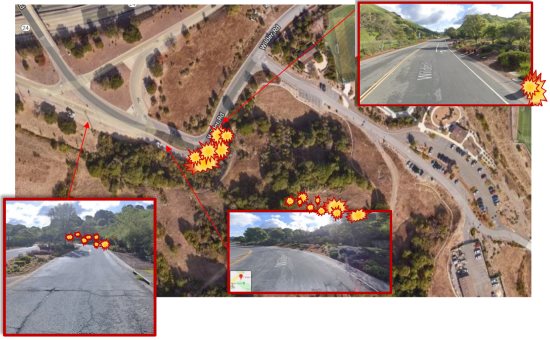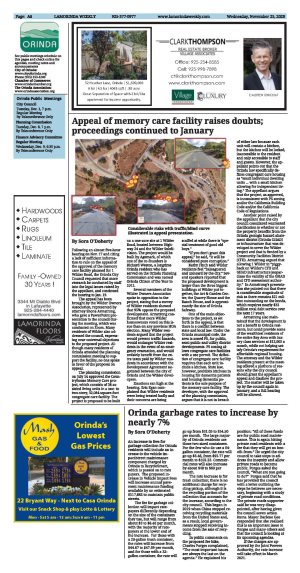| | Published November 25th, 2020
| Appeal of memory care facility raises doubts; proceedings continued to January
| | | By Sora O'Doherty |  | | Considerable risks with traffic/blind curve illustrated in appeal presentation. |
Following an almost five-hour hearing on Nov. 17 and citing a lack of sufficient information to rule on the appeal of the approval of the memory care facility planned for 1 Wilder Road, the Orinda City Council requested that more research be conducted by staff into the legal issues raised by the appellant, and continued the hearing to Jan. 19.
 The appeal has been brought by the Wilder Owners Association, represented by attorney Shona Armstrong, who gave a PowerPoint presentation to the council during the meeting, which was conducted on Zoom. Many residents of Wilder also addressed the council, expressing near universal objections to the proposed project. Although many residents of Orinda attended the planning commission meeting to support the facility, no one spoke in favor of the proposal on appeal.
The appeal has been brought by the Wilder Owners Association, represented by attorney Shona Armstrong, who gave a PowerPoint presentation to the council during the meeting, which was conducted on Zoom. Many residents of Wilder also addressed the council, expressing near universal objections to the proposed project. Although many residents of Orinda attended the planning commission meeting to support the facility, no one spoke in favor of the proposal on appeal.
 The planning commission on July 14 approved the Countryhouse Memory Care project, which consists of 38 assisted living units in a one- to two-story, 32,084-square-foot congregate care facility. The project is proposed to be built on a one-acre site at 1 Wilder Road, located between Highway 24 and the Wilder Subdivision. The project would be built by Agemark, of which one of the co-founders is Richard Weston, a longtime Orinda resident who has served on the Orinda Planning Commission and was named Orinda Citizen of the Year in 2012.
The planning commission on July 14 approved the Countryhouse Memory Care project, which consists of 38 assisted living units in a one- to two-story, 32,084-square-foot congregate care facility. The project is proposed to be built on a one-acre site at 1 Wilder Road, located between Highway 24 and the Wilder Subdivision. The project would be built by Agemark, of which one of the co-founders is Richard Weston, a longtime Orinda resident who has served on the Orinda Planning Commission and was named Orinda Citizen of the Year in 2012.
 Several members of the Wilder Owners Association spoke in opposition to the project, stating that a survey of Wilder residents showed that 95% oppose the proposed development. Armstrong confirmed that more Wilder homeowners voted on this issue than on any previous HOA election. Many Wilder residents argued that the project would present traffic hazards, would endanger Wilder residents in the event of an emergency evacuation, and would unfairly benefit from the extra taxes paid by Wilder residents in accordance with the Development Agreement negotiated between the city of Orinda and the Wilder developers.
Several members of the Wilder Owners Association spoke in opposition to the project, stating that a survey of Wilder residents showed that 95% oppose the proposed development. Armstrong confirmed that more Wilder homeowners voted on this issue than on any previous HOA election. Many Wilder residents argued that the project would present traffic hazards, would endanger Wilder residents in the event of an emergency evacuation, and would unfairly benefit from the extra taxes paid by Wilder residents in accordance with the Development Agreement negotiated between the city of Orinda and the Wilder developers.
 Emotions ran high at the hearing. Eric Egan complained that Wilder residents were being treated badly and their concerns are being scoffed at while there is "special treatment of good old boys."
Emotions ran high at the hearing. Eric Egan complained that Wilder residents were being treated badly and their concerns are being scoffed at while there is "special treatment of good old boys."
 "If you don't grant this appeal," he said, "it will be considered pure corruption."
"If you don't grant this appeal," he said, "it will be considered pure corruption."
 Kathy Finch said Wilder residents feel "beleaguered and unheard by the city." Several speakers reported that the proposed development is larger than the three biggest buildings at Wilder put together, the Art & Garden Center, the Quarry House and the Ranch House, and is approximately the size of Orinda Safeway.
Kathy Finch said Wilder residents feel "beleaguered and unheard by the city." Several speakers reported that the proposed development is larger than the three biggest buildings at Wilder put together, the Art & Garden Center, the Quarry House and the Ranch House, and is approximately the size of Orinda Safeway.
 One of the main objections to the project, as set forth in the appeal, is that there is a conflict between state and local law. Under the Orinda municipal code, the area is zoned PS, for public, semi-public and utility district developments. PS zoning allows congregate care facilities with a use permit. The definition of congregate care facility requires that each unit include a kitchen. State law, however, prohibits kitchens in housing for dementia patients and housing dementia patients is the sole purpose of the memory care facility. The developer, with the approval of the planning commission, argues that it is not in breach of either law because each unit will contain a kitchen, but the kitchen will be locked, inaccessible to the resident and only accessible to staff and guests. However, the appellant points out that the Orinda law specifically defines congregant care housing as "small individual dwelling units . with a small kitchen allowing for independent living." The appellant argues that the project, as approved, is inconsistent with PS zoning and/or the California Building Code and/or the California Code of Regulations.
One of the main objections to the project, as set forth in the appeal, is that there is a conflict between state and local law. Under the Orinda municipal code, the area is zoned PS, for public, semi-public and utility district developments. PS zoning allows congregate care facilities with a use permit. The definition of congregate care facility requires that each unit include a kitchen. State law, however, prohibits kitchens in housing for dementia patients and housing dementia patients is the sole purpose of the memory care facility. The developer, with the approval of the planning commission, argues that it is not in breach of either law because each unit will contain a kitchen, but the kitchen will be locked, inaccessible to the resident and only accessible to staff and guests. However, the appellant points out that the Orinda law specifically defines congregant care housing as "small individual dwelling units . with a small kitchen allowing for independent living." The appellant argues that the project, as approved, is inconsistent with PS zoning and/or the California Building Code and/or the California Code of Regulations.
 Another point raised by the appellant that the city council considered warranted clarification is whether or not the property benefits from the Orinda geologic hazard abatement district (Orinda GHAD) or infrastructure that was developed to serve the Wilder project and that is funded by a Community Facilities District (CFD). Armstrong argued that allowing 1 Wilder to "piggy-back on Wilder's CFD and GHAD infrastructure jeopardizes the validity of the GHAD and CFD assessment authority." In Armstrong's presentation she pointed out that there is considerable magnitude of risk as there remains $21 million outstanding on the bonds, which requires nearly $33 million total debt service over the next 17 years.
Another point raised by the appellant that the city council considered warranted clarification is whether or not the property benefits from the Orinda geologic hazard abatement district (Orinda GHAD) or infrastructure that was developed to serve the Wilder project and that is funded by a Community Facilities District (CFD). Armstrong argued that allowing 1 Wilder to "piggy-back on Wilder's CFD and GHAD infrastructure jeopardizes the validity of the GHAD and CFD assessment authority." In Armstrong's presentation she pointed out that there is considerable magnitude of risk as there remains $21 million outstanding on the bonds, which requires nearly $33 million total debt service over the next 17 years.
 Armstrong also maintained that the development is not a benefit to Orinda residents, but could provide some of the wealthiest residents of the entire Bay Area with luxury class services at $12,000 a month, while not helping satisfy Orinda's requirement for affordable regional housing. The attorney and the Wilder residents present at the meeting offered a plethora of reasons why the city council should grant the appellant's appeal and disallow the project. The matter will be taken up by the council again in January, and a full hearing will be allowed.
Armstrong also maintained that the development is not a benefit to Orinda residents, but could provide some of the wealthiest residents of the entire Bay Area with luxury class services at $12,000 a month, while not helping satisfy Orinda's requirement for affordable regional housing. The attorney and the Wilder residents present at the meeting offered a plethora of reasons why the city council should grant the appellant's appeal and disallow the project. The matter will be taken up by the council again in January, and a full hearing will be allowed. |
| | | | | | | | | | | | |



